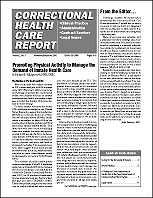Psychiatric Disorders, Antipsychotic Usage and Comorbid Diabetes Mellitus
Author: Patrick A. Toalson, R.Ph., BCPP.; Leslie M. Schuh, Ph.D..; John P. Houston, M.D., Ph.D..
Source: Volume 05, Number 04, May/June 2004 , pp.37-42(6)

< previous article |next article > |return to table of contents
Abstract:
Psychiatric disorders are prevalent among inmates in correctional settings. Over the past decade atypical antipsychotics have become more important in the treatment of patients with psychosis- related disorders such as schizophrenia. Atypical antipsychotics have superior clinical efficacy, a better safety profile regarding extrapyramidal symptoms, and prolactin levels are generally lower in patients treated with most atypical antipsychotic agents compared to the conventional antipsychotics used in clinical practice since the 1950s. Despite this overall superior safety profile, some have raised concerns regarding possible associations with various metabolic disruptions including weight gain, hyperglycemia and diabetes. There is debate questioning what relationship exists, if any, between hyperglycemia and diabetes in patients with serious mental illnesses and the use of antipsychotic treatments.Keywords: Epidemiological Studies, insulin, aripiprazole, haloperidol, olanzapine
Affiliations:
1: Eli Lilly; 2: Eli Lilly; 3: Eli Lilly.